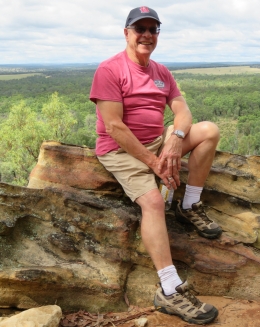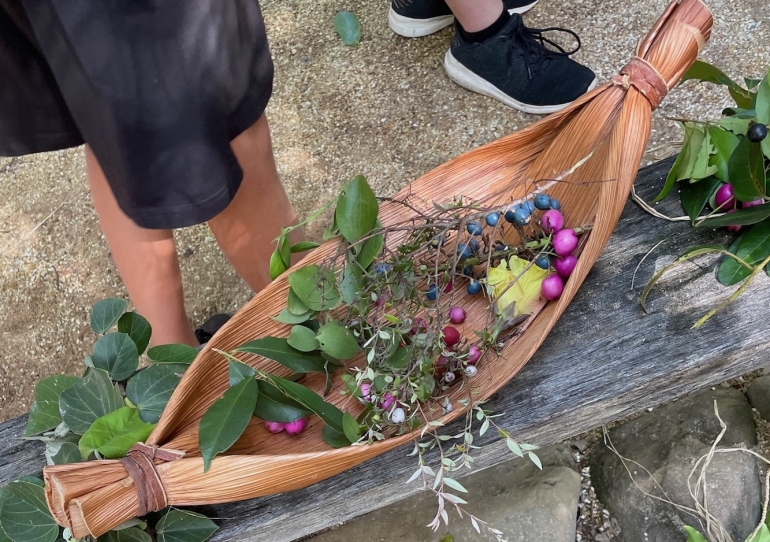The Culturally Nourishing Schooling (CNS) project, led by Associate Professor Kevin Lowe a Gubbi Gubbi man and UNSW Scientia Indigenous Research Fellow, has received a $3 million gift from the Paul Ramsay Foundation.
CNS is part of a collaborative research study investigating strategies to improve teaching and learning outcomes for Aboriginal and Torres Strait Islander students. It emphasises the establishment of meaningful relationships and connections with Country and localised Indigenous knowledges, histories and experiences.
“The Paul Ramsay Foundation’s generous gift enables us to bring together a team of experts to develop the CNS program, trial the approach and gather resources and findings over the next three years,” said A/Prof. Lowe.
“It supports teachers and school leaders to work together with families and communities to transform schooling for Indigenous students through holistic, student-centred and locally focused strategies.”
The Paul Ramsay Foundation is supporting the CNS project through its Learning Lives, Strengthened in Culture program, which embraces Indigenous-led education practices to address systemic issues that prevent Aboriginal and Torres Strait Islander students’ success.
Professor Kristy Muir, Chief Alliances Officer of the Paul Ramsay Foundation, said the program was a vital step in the Foundation’s commitment to improving education outcomes, and that the CNS program was the embodiment of that aim.
“We have a long-term ambition for change, with a common belief that growing strong in culture, and academic excellence, are mutually reinforcing,” Prof. Muir said.
“The CNS program, by supporting teachers and school leaders, is an exciting program, taking a holistic and robust approach to transforming schooling for Indigenous students.”
UNSW Vice-Chancellor and President Professor Attila Brungs thanked the Paul Ramsay Foundation for its generous gift.
“Research like the CNS project is vital if we are to understand and address the systemic drivers of educational disadvantage among Aboriginal and Torres Strait Islander students. I applaud the project team for focus on making concrete change and thank the Paul Ramsay Foundation for sustaining that work over the next three years.”

Associate Professor Kevin Lowe on a Learning from Country trip. Photo: Supplied.
Dean of UNSW Arts, Design & Architecture Professor Claire Annesley also acknowledged the generous donation and the project’s significant impact.
“This incredible partnership between Associate Professor Kevin Lowe and the Paul Ramsay Foundation has the capacity to transform the school experiences of Aboriginal and Torres Strait Islander students across NSW,” she said.
Culturally Nourishing Schooling
A/Prof. Lowe said CNS aims to improve teachers’ understandings and professional practices in supporting Aboriginal and Torres Strait Islander students.
“It will also establish a sustainable base for the long-term collaboration between Aboriginal and Torres Strait Islander families, communities and schools, and a whole-school model of schooling that supports the needs and aspirations of the students,” he said.
The CNS project builds on research begun by A/Prof. Lowe and Associate Professor Cathie Burgess (University of Sydney) in 2016 when they commenced a project with 14 academics across 10 Australian universities to investigate a decade of educational research in the area. From this, they developed the strategies of the CNS concept.
The project is now investigating the efficacy of five strategies that work together to support schools in building collaborative relationships with Aboriginal and Torres Strait Islander communities, learn about Country and culture, and incorporate Indigenous knowledges, histories and languages into teaching and learning. The strategies are:
- Learning from Country – schools spend two to three days on Country learning from community, exchanging knowledges and thinking about Indigenous ways of knowing, doing and being.
- Curriculum Workshops to support teachers to centre Indigenous content and ways of thinking, being and doing in curriculum and pedagogical practices.
- Professional Learning Conversations for teachers, leaders, researchers and Cultural Mentors to read articles, discuss concepts related to pedagogy and curriculum choices and connect this to their own local contexts, practices and ways of working.
- Culturally Nourishing Pedagogies – professional learning for teachers to develop and reflect on teaching and learning practices.
- Cultural Mentoring – local Cultural Mentors are employed to work collaboratively with teachers to develop curriculum, pedagogy and assessment.
The CNS project kicked off with a pilot phase in 2021 and 2022 is its first full year of implementation. It currently involves eight schools spread across urban, regional, rural and remote locations in NSW.
Read more: UNSW Arts & Social Sciences researchers receive ARC Discovery Indigenous grants
A/Prof. Lowe leads the team of academic and project staff from UNSW, the University of Sydney, Griffith University, Queensland University of Technology (QUT) and the University of Southern Queensland (USQ). The PRF philanthropic donation has been used to employ five staff to support the project with expertise in teacher professional learning, community facilitation, communications, project management, and quantitative and mixed methods research.
According to A/Prof. Lowe, the hope is to secure further funding beyond the three-year term to expand the project into more schools and eventually into other states.
